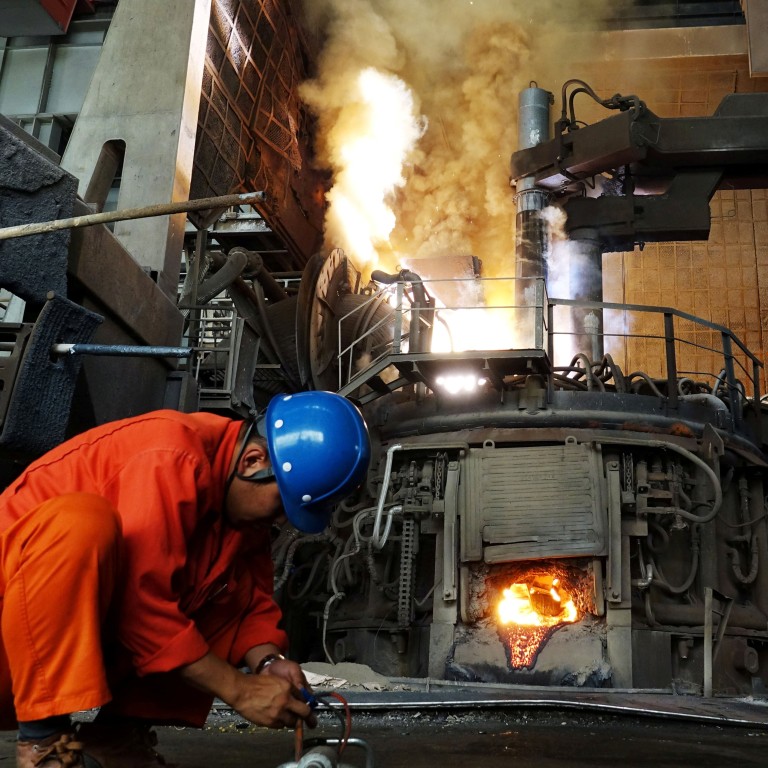
Market woes continue into 2019 as China, Hong Kong stocks kick off new year with losses amid fresh indications of slowdown
- Shanghai Composite Index ends Wednesday 1.15 per cent lower, while the Hang Seng Index declines by 2.77 per cent
- Two gauges show manufacturing has contracted in China
The stock markets in mainland China and Hong Kong kicked off 2019 with losses, after two gauges indicated manufacturing had contracted in China, the world’s second-largest economy, and added to concerns about a slowdown.
On the mainland, the benchmark Shanghai Composite Index dropped 1.15 per cent, or 28.61 points, to 2,465.29 at the close on Wednesday, its lowest since November 7, 2014. In Hong Kong, the benchmark Hang Seng Index, which is packed with mainland Chinese companies, declined by 2.77 per cent, or 715.35 points, to 25,130.35.
What should traders of Hong Kong, China stocks expect after a year of ‘heaven to hell’?
Equity gauges elsewhere in Asia also fell – South Korea’s Kospi and Australia’s S&P/ASX 200 Index shed 1.5 per cent and 0.6 per cent, respectively. Taiwan’s Taiex index lost 1.78 per cent after Chinese President Xi Jinping said in a speech in Beijing that the island must be united with mainland China. Japan’s markets were closed for a holiday.
“The entire market is pessimistic about growth prospects and nothing can reverse such a mood on the policy front,” said Wu Kan, an investment manager at Soochow Securities in Shanghai. “The woes aren’t going to end soon.”
The Shanghai Composite Index ended 2018 with an overall decline of 25 per cent, making it the world’s worst-performing stock benchmark. Meanwhile, the Hang Seng Index fell by 14 per cent for its worst performance in seven years. Many traders had been hoping the new year would mark a turning point, but a snapshot of preliminary economic data has dashed such optimism for now.
China’s official purchasing managers’ index of the manufacturing sector dropped to 49.4 in December, from 50 in November, according to a National Bureau of Statistics survey on Monday. A reading below 50 indicates contraction and December’s drop is the first to go below the line since July 2016.
A private gauge by Caixin/Markit released on Wednesday, that focuses on smaller industrial companies, also slipped to 49.7 from 50.2 in November, in its first contraction in 19 months. Also, economic growth in China may have slowed to 6.4 per cent in the fourth quarter from 6.5 per cent for the previous three-month period, according to Bloomberg.
Hong Kong stocks down a wretched 14 per cent in 2018 – the worst performance in 7 years
Last year was also unpleasant for global markets, with US stocks ending 2018 with their smallest gain since the global financial crisis in 2007-08, and crude oil capping its first annual loss since 2015. Traders are concerned about fast increases in borrowing costs, as well as growth that may have already peaked in the United States, the world’s largest economy.
Health care stocks led the declines on the mainland and in Hong Kong on Wednesday, as the sector continues to be haunted by fear of a pilot programme of centralised procurement of generic drugs that has brought down prices by an average of 50 per cent since it began in early December. In Hong Kong, the sector lost 4.62 per cent; in Shanghai, it dropped 2.78 per cent.
Yanan Bicon Pharmaceutical Listed tumbled by the daily limit of 10 per cent in Shenzhen before ending down 6.93 per cent at 19.62 yuan, while Kangmei Pharmaceutical dropped by the 10 per cent limit to 8.29 yuan. In Hong Kong, CSPC Pharmaceutical Group shed 5.84 per cent to HK$10.66 and Sino Biopharmaceutical tumbled by 3.68 per cent to HK$4.97.
Chinese pharmaceutical stocks plunge on bigger than expected price cuts of generic drugs on compulsory bulk tendering
Gold producer Zijin Mining Group almost lost by the daily limit in Shanghai, shedding 9.88 per cent to 3.01 yuan, after it said it planned to raise as much as 8 billion yuan (US$1.17 billion) by selling additional new shares in mainland China. Its shares traded in Hong Kong fell by 5.05 per cent to HK$2.82.
Kweichow Moutai, the world’s most valuable distiller, added 1.52 per cent to 598.98 yuan after saying its full-year profit for 2018 would probably rise by 25 per cent.
In Hong Kong, shares in real estate developers were hit after its lived-in home prices index fell by 3.5 per cent in November, its largest decline since November 2008, according to official data. In October, it dropped by 2.6 per cent month on month, and in September, by 1.3 per cent.
Evergrande Group led the declines, slumping by 7.04 per cent, while China Resources Land lost 6.15 per cent, China Overseas dropped 5.58 per cent and CK Asset fell by 3.14 per cent.
The US-China trade war continues to be a wild card for equities. A US delegation will hold trade talks with Chinese officials in Beijing next week to try to iron out differences over such things as market access and intellectual property protection.
China to host US trade talks in Beijing in early January
An end to the trade war could boost battered stocks in mainland China and Hong Kong. A number of analysts expect 2019 will be better for these markets. Deutsche Bank has forecast a 10 per cent increase in the Hong Kong market, while Morgan Stanley and Goldman Sachs have forecast single-digit returns. Swiss bank UBS expects China will deliver a high single-digit rate of growth.


